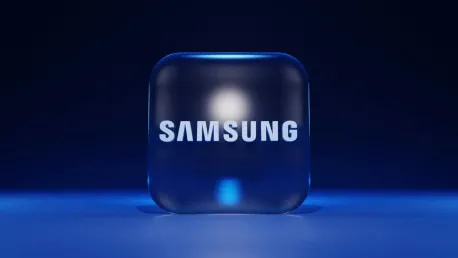The global technology landscape is undergoing a seismic shift driven by the explosive growth in demand for Artificial Intelligence (AI) products. This rapid evolution presents both immense opportunities and significant challenges for traditional tech giants like Samsung. Historically dominant in memory chips and consumer electronics, Samsung is now grappling with the fast-paced advancements and specialized demands of the AI sector. Recent warnings about lower-than-expected earnings have raised concerns about Samsung’s ability to adapt and thrive in this new environment. The company’s ability to navigate these turbulent waters will serve as a litmus test, not just for its own future, but as a case study for other tech giants facing similar challenges.
The Rise of AI and Its Implications
AI has started to play a pivotal role in transforming various sectors within technology. At its core, AI relies heavily on specialized chips designed to handle complex computations and data processing tasks. These AI-optimized chips are becoming essential for developing advanced applications, from machine learning to autonomous vehicles. The demand for these chips has skyrocketed, necessitating a significant shift in the manufacturing processes and technologies employed by tech firms. The complexity involved in creating these advanced chips pushes companies toward innovation and rapid technological advancement.
Samsung, known for its prowess in memory chips and consumer electronics, finds itself in an unfamiliar landscape. The complexity of designing and fabricating AI-optimized chips requires a different set of skills and technologies, compelling the company to innovate at an unprecedented rate. The company’s recent warning about lower third-quarter profits is a stark reflection of these challenges, marking a critical juncture where tradition meets innovation. The struggle isn’t merely a financial issue but a sign of the broader difficulties involved in adapting to the AI-driven market changes.
Samsung is being forced to re-evaluate its core competencies and invest heavily in new technologies to remain relevant. The rising demand for AI products suggests a market entering a transformative phase, where traditional methods and technologies may no longer suffice. The firm’s ability to pivot quickly and effectively will determine whether it can capture the immense opportunities presented by the AI surge. This also highlights the need for robust research and development departments capable of spearheading new initiatives that cater to AI-specific requirements.
Challenges for Traditional Tech Giants
The rapid advancements in AI pose substantial challenges for established tech giants like Samsung and Intel. Historically, these companies have maintained dominance in their respective markets through incremental innovations and large-scale manufacturing capabilities. However, the advent of AI has unveiled vulnerabilities, as the demand for specialized, high-performance chips outpaces their current production capacities. This demands not only a shift in how these chips are produced but also a rethinking of existing business strategies. The legacy advantage held by these giants is rapidly diminishing in the face of such swift industry changes.
Samsung, in particular, has faced significant struggles in meeting these new demands. Reports of delays in AI chip supplies to major customers, such as Nvidia, exemplify the hurdles the company must overcome. This situation is further exacerbated by intensified competition from specialized firms and emerging players in the AI space. The market is evolving rapidly, and traditional tech giants must adapt quickly to remain competitive. This includes investing in new manufacturing techniques, better resource allocation, and streamlining their existing processes to match the pace of the industry.
For Samsung, the challenges are multifaceted. The company must balance its core business of memory chips and consumer electronics while making inroads into AI-optimized chip production. This is particularly taxing given the capital-intensive nature of semiconductor manufacturing. Moreover, the need to divert resources and attention to AI technologies can strain Samsung’s existing business units. The pressure to innovate rapidly while maintaining quality and meeting customer expectations presents a serious challenge to its established business model.
Market Dynamics and Heightened Competition
Samsung’s challenges are not isolated incidents but rather symptomatic of broader industry-wide transformations. The competitive landscape is growing more complex with increased participation from both established leaders like Taiwan Semiconductor and emerging rivals from China. These new entrants are aggressively vying for market share, putting additional pressure on traditional chipmakers. The complexities of the global market are highlighted by the need to innovate constantly to stay ahead, which is no small feat in a fiercely competitive environment.
The delay in Samsung’s AI chip business with Nvidia underscores the intricate and competitive nature of the market. Concurrently, Samsung is finding its dominance in the memory chip sector contested by competitors such as SK Hynix, particularly in the realm of high-bandwidth memory (HBM) chips critical for AI applications. These market dynamics are reshaping global commerce, with tech hubs like Silicon Valley, Seoul, and Shenzhen at the forefront of this evolution. Each hub is developing unique approaches to capture the growing demand for AI-optimized products.
The heightened competition from global and local players emphasizes the need for strategic collaborations and partnerships. Samsung’s ability to form alliances with other tech companies could provide the necessary leverage to navigate the competitive landscape. Coupled with its integrated approach of combining development, design, and manufacturing under one roof, such partnerships can offset some of the competitive pressures. However, Samsung must remain vigilant in maintaining quality and innovation to avoid losing its competitive edge.
Impact on Various Tech Sectors
The influence of AI extends beyond just the realms of chips and semiconductors; it is driving fundamental changes across various tech sectors, including the smartphone market. As AI applications become more sophisticated, the hardware requirements for devices have also evolved, prompting innovation in mobile technologies. This shift impacts manufacturers like Samsung, who must continually adapt their products to incorporate these advanced functionalities. The demand for smarter, faster, and more efficient devices has never been higher, compelling Samsung to recalibrate its approach to product development.
Samsung’s integrated approach, which combines in-house development, design, and semiconductor foundry capacity, positions it uniquely to leverage these changes. However, the ability to efficiently scale these innovations will determine its success. The smartphone sector, like many others, is experiencing the ripple effects of AI demand, pushing companies to rethink their strategies and product offerings. From enhanced camera capabilities driven by AI to smarter user interfaces, the incorporation of AI technologies is redefining what consumers expect from their devices.
AI is also fostering a new era of customized consumer experiences. From personalized recommendations to intelligent virtual assistants, Samsung must focus on harnessing the full potential of AI to stay ahead in the market. Implementing AI-driven features not only in smartphones but across its range of consumer electronics can provide Samsung with a competitive edge. However, the challenges of efficient scalability and seamless integration of these features remain critical areas that the company needs to address to maintain its market position.
Overarching Trends and Strategic Repositioning
Several overarching trends are emerging from the ongoing shifts in global technology commerce, driven predominantly by AI. First, AI is now a central market driver, compelling companies to innovate rapidly or face obsolescence. This necessity for swift innovation places immense pressure on traditional tech giants, who must pivot their strategies to stay relevant in the face of specialized competition. The era demands a significant re-evaluation of existing paradigms and the fast adoption of AI-driven methodologies across various levels of operations.
Moreover, the convergence of hardware, software, and services is reshaping competitive dynamics. Companies that once specialized in a single aspect of technology are now expanding their capabilities to offer comprehensive solutions. This convergence is creating new business models and opportunities, blurring the lines between traditional industry boundaries. Samsung’s experience serves as a case study in this broader trend. The company’s efforts to diversify its portfolio and integrate AI capabilities across its products signify a critical shift toward aligning with the new market realities.
However, the journey is fraught with challenges, requiring unwavering commitment to innovation and strategic repositioning. As Samsung endeavors to enhance its AI capabilities, it must focus on fostering an ecosystem that supports these changes. This includes investing in R&D, forging strategic alliances, and ensuring that the entire organizational structure is geared towards embracing and leveraging AI technologies. The evolving market is unforgiving, and only those who adapt promptly will survive the tumultuous waters of the tech landscape.
Confronting the Future with Adaptability
The global tech landscape is experiencing a transformative shift fueled by the skyrocketing demand for Artificial Intelligence (AI) products. This rapid change brings huge opportunities as well as formidable challenges, especially for established tech powerhouses like Samsung. Traditionally a leader in memory chips and consumer electronics, Samsung now finds itself navigating the swiftly changing and highly specialized demands of the AI sector. The company recently issued warnings about lower-than-expected earnings, raising concerns about its adaptability and resilience in this new arena. These developments highlight Samsung’s struggle to stay relevant amidst the AI-driven evolution. How well Samsung adapts to these challenges will not only influence its own future but will also serve as a critical example for other major tech companies encountering similar hurdles. Samsung’s ability to steer through this complex landscape will be scrutinized closely, as it seeks to transform and possibly redefine its role in the era dominated by AI advancements.









